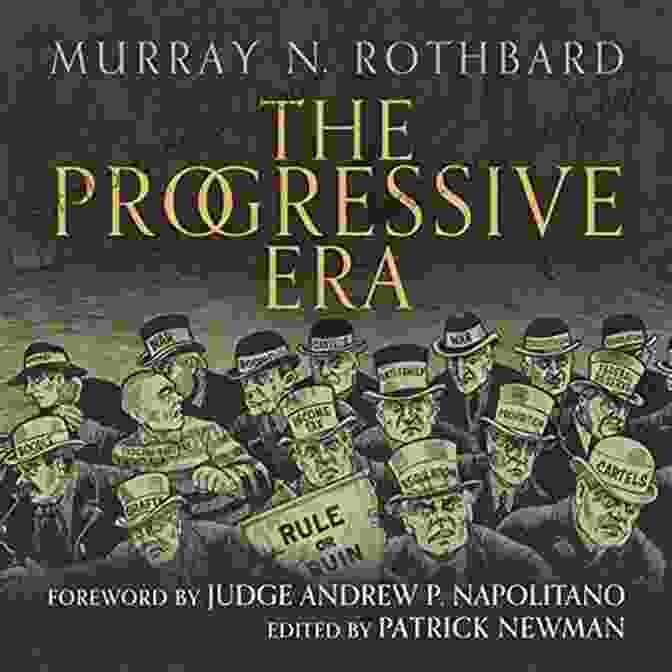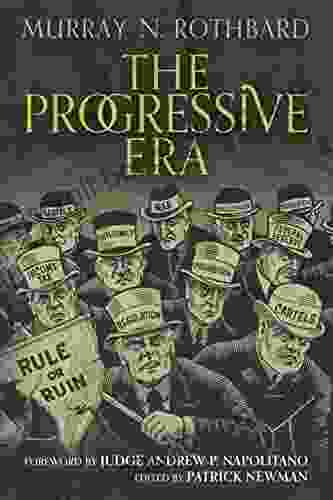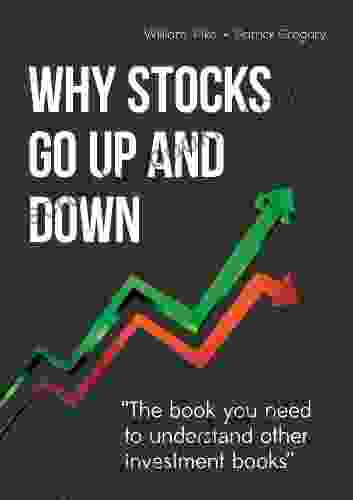Unveiling the Progressive Era: A Journey into the Roots of Modern Statism


4.7 out of 5
| Language | : | English |
| File size | : | 4715 KB |
| Text-to-Speech | : | Enabled |
| Screen Reader | : | Supported |
| Enhanced typesetting | : | Enabled |
| X-Ray | : | Enabled |
| Word Wise | : | Enabled |
| Print length | : | 604 pages |
| Lending | : | Enabled |
In the annals of American history, the Progressive Era stands as a watershed moment, a transformative period that left an indelible mark on the nation's political, economic, and social fabric. From the early 20th century to the 1920s, a surge of reformist fervor swept across the country, fueled by a deep-seated belief in the power of government to solve societal problems.
Amidst the tumult of this era, Murray Rothbard emerged as a lone dissenting voice, a staunch defender of individual liberty and free markets. In his seminal work, The Progressive Era, Rothbard meticulously dissects the intellectual and political currents that shaped this pivotal chapter in American history, exposing the insidious roots of modern statism.
The Myth of Progressivism
Rothbard begins by deconstructing the myths and misconceptions that have clung to the Progressive Movement. Contrary to popular belief, he argues that progressivism was far from a benevolent force seeking to uplift the downtrodden. Instead, it was a thinly veiled agenda driven by an insatiable lust for power and control.
Progressives, Rothbard contends, were not champions of the common man but elitists who sought to impose their own moral and economic visions upon society. They viewed government as a benevolent deity capable of solving every social ill, from poverty to inequality to environmental degradation.
The Erosion of Liberty
As progressivism gained momentum, so too did the erosion of individual liberty. Rothbard documents the systematic dismantling of constitutional protections, the rise of regulatory agencies with unchecked power, and the increasing use of government coercion to silence dissent.
The Progressive Movement, Rothbard writes, "was a disaster for American liberty." It laid the groundwork for the "welfare-warfare" state that would dominate the 20th century, sacrificing individual freedom and economic prosperity at the altar of government intervention.
The Intellectual Roots
To fully understand the origins of progressivism, Rothbard delves into the intellectual climate of the late 19th and early 20th centuries. He traces the influence of Prussian statism, Fabian socialism, and the collectivist ideas of Herbert Spencer and Lester Ward.
These intellectuals, Rothbard argues, provided the intellectual justification for an ever-expanding role of government in society. They promoted the notion that society was an organic whole, superior to the individual, and that government should actively intervene to shape its destiny.
The Political Alliances
While intellectuals provided the ideological underpinnings of progressivism, it was political alliances that propelled it into the mainstream. Rothbard meticulously analyzes the unholy coalition between big business, organized labor, and the political establishment that formed the backbone of the Progressive Movement.
Each group had its own motives for supporting progressivism. Business sought government protection from competition, labor sought government-mandated benefits, and politicians sought to expand their power and patronage.
The Consequences of Progressivism
The Progressive Era left an enduring legacy on American society. Rothbard argues that the government interventions and social reforms implemented during this period had disastrous consequences for economic growth, individual liberty, and the health of civil society.
Protectionist tariffs stifled innovation, minimum wage laws priced workers out of the market, and the creation of the Federal Reserve led to rampant inflation and economic instability.
A Call to Reclaim Liberty
The Progressive Era is not merely a historical account but a clarion call to reclaim the principles of individual liberty and free markets. Rothbard urges readers to reject the collectivist mentality that has gripped society and embrace the timeless principles of natural rights and limited government.
"The Progressive Era," Rothbard concludes, "was a dark chapter in American history, a time when individual liberty was sacrificed at the altar of statism." By understanding the origins and consequences of progressivism, we can prevent its resurgence and safeguard our precious freedoms for generations to come.
Murray Rothbard's The Progressive Era is an indispensable work for anyone seeking to understand the transformative period that shaped modern statism. With meticulous research and incisive analysis, Rothbard exposes the fallacies of progressivism and its devastating impact on liberty and prosperity.
As we navigate the challenges of the 21st century, Rothbard's masterpiece serves as a timely reminder of the perils of government overreach and the enduring importance of individual freedom. Let us heed his call to reclaim our liberties and restore America to its rightful place as a beacon of hope for all who cherish the principles of self-governance and economic prosperity.
4.7 out of 5
| Language | : | English |
| File size | : | 4715 KB |
| Text-to-Speech | : | Enabled |
| Screen Reader | : | Supported |
| Enhanced typesetting | : | Enabled |
| X-Ray | : | Enabled |
| Word Wise | : | Enabled |
| Print length | : | 604 pages |
| Lending | : | Enabled |
Do you want to contribute by writing guest posts on this blog?
Please contact us and send us a resume of previous articles that you have written.
 Book
Book Novel
Novel Page
Page Chapter
Chapter Text
Text Story
Story Genre
Genre Reader
Reader Library
Library Paperback
Paperback E-book
E-book Magazine
Magazine Newspaper
Newspaper Paragraph
Paragraph Sentence
Sentence Bookmark
Bookmark Shelf
Shelf Glossary
Glossary Bibliography
Bibliography Foreword
Foreword Preface
Preface Synopsis
Synopsis Annotation
Annotation Footnote
Footnote Manuscript
Manuscript Scroll
Scroll Codex
Codex Tome
Tome Bestseller
Bestseller Classics
Classics Library card
Library card Narrative
Narrative Biography
Biography Autobiography
Autobiography Memoir
Memoir Reference
Reference Encyclopedia
Encyclopedia Theresa Weir
Theresa Weir Erica Bauermeister
Erica Bauermeister Larry Kaniut
Larry Kaniut Erik Weir
Erik Weir Eric Wargo
Eric Wargo Paul Long
Paul Long Erica Layne
Erica Layne Fran Yardley
Fran Yardley Robert Michael Pyle
Robert Michael Pyle Nina Lacour
Nina Lacour Erich Schwartzel
Erich Schwartzel Erving Goffman
Erving Goffman Justine Cara Weld
Justine Cara Weld Harvey J Kaye
Harvey J Kaye J M Calverley
J M Calverley Ginger Lawrence
Ginger Lawrence Hendrik Maarten
Hendrik Maarten Julian Hawking
Julian Hawking Micah Toll
Micah Toll Jerry C Whitaker
Jerry C Whitaker
Light bulbAdvertise smarter! Our strategic ad space ensures maximum exposure. Reserve your spot today!

 Preston SimmonsUnlock the Serene Power of Simplicity: Embark on the Not So Simple Art of...
Preston SimmonsUnlock the Serene Power of Simplicity: Embark on the Not So Simple Art of...
 Travis FosterMemoir of a Liberian Civil War Survivor: An Unforgettable Story of Resilience...
Travis FosterMemoir of a Liberian Civil War Survivor: An Unforgettable Story of Resilience... Dawson ReedFollow ·2k
Dawson ReedFollow ·2k Lord ByronFollow ·18.4k
Lord ByronFollow ·18.4k Henry GreenFollow ·2.9k
Henry GreenFollow ·2.9k Floyd PowellFollow ·7.3k
Floyd PowellFollow ·7.3k Jamie BellFollow ·4.1k
Jamie BellFollow ·4.1k VoltaireFollow ·3.2k
VoltaireFollow ·3.2k Foster HayesFollow ·14.4k
Foster HayesFollow ·14.4k Haruki MurakamiFollow ·9.2k
Haruki MurakamiFollow ·9.2k

 Roland Hayes
Roland HayesMagda: A Mother's Love, A Daughter's Redemption - A...
Immerse Yourself in the Captivating True Story...

 Spencer Powell
Spencer PowellSnow White Retold: A Tale of Love, Magic, and...
Once upon a time, in...

 Jake Powell
Jake PowellMaster the SATs with Effective Strategies from 99th...
The SATs are a challenging exam,...

 Brian Bell
Brian BellSEO for Dummies: Unlock the Secrets to Search Engine...
In today's digital...

 Jaylen Mitchell
Jaylen MitchellBechtel: Unveiling the Unsung Heroes Who Built the World
In the annals of global infrastructure, the...
4.7 out of 5
| Language | : | English |
| File size | : | 4715 KB |
| Text-to-Speech | : | Enabled |
| Screen Reader | : | Supported |
| Enhanced typesetting | : | Enabled |
| X-Ray | : | Enabled |
| Word Wise | : | Enabled |
| Print length | : | 604 pages |
| Lending | : | Enabled |










